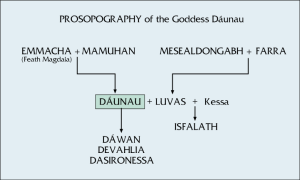Difference between revisions of "Dáunau"
Trismegistus (talk | contribs) (created) |
Trismegistus (talk | contribs) m |
||
| (7 intermediate revisions by the same user not shown) | |||
| Line 1: | Line 1: | ||
| − | + | [[File:GoddessDaunauPortrait_A_MDJ.png|thumb|200px|The goddess Daunau holds sway over the sea and prophecy. Midjourney]] | |
| − | Dáunau is a sea goddess by birth, | + | The goddess Dáunau was commonly called [[Uki]] among the ancient Moigthe to avoid using her name. Her origin is believed to spring from both [[Tuadbe]] and [[Moigthe]] legend. Her namesake, Dáunau, is the origin of the word ‘[[Donavish]].’ She was a sea goddess by birth, the daughter of [[Feath]] and [[Mamuhan]] (Eshik). She ruled over the power of prophecy and is said to dwell in a sea cave along the southern coast of [[Pytharnia]]. Anyone who finds and enters the cave, is said to be able to ask the goddess one question that she answers willingly and truthfully. She is the patron goddess of those who seek knowledge, especially critical or esoteric and unlike her husband [[Threy]] ([[Luvas]]), Dáunau is thought to protect her propitiators from the dangers of such knowledge. She was worshiped throughout southern Pytharnia and to a lesser extent throughout the rest of the [[Pallathantic]]. Her oldest daughter, [[Dáwan]], was thought to look nearly indistinguishable from her. |
| + | |||
| + | Her consort is the god Luvas, the god of wealth and necromancy. She tolerates her husband's many infidelities and often defends him among the Isxinthions when his indiscretions invoke the wrath of the gods. At crucial times, she can rely on him to do her bidding. Dáunau does not own the great hall of her husband Luvas, [[Ifferadindala]], and this vexes her from time to time as he can hold his own court without her and commit his many adulteries there. Luvas himself does not own the hall Ifferadindala, but governs its affairs in accordance to an ancient custom of priestly rule. Once Dáunau tried to have Luvas swindled of his great hall. This scheme nearly succeeded, but Luvas desperately outmatched her. The two came to an understanding afterwards. | ||
| + | |||
| + | Dáunau holds court in her sea cave along the coast of southern Pytharnia. Several caves have been attributed to her and these are all thought spurious by scholar-priests of the [[Old Religion]] who suspect that her sea cave rests in the other world. Sometimes a rift between the worlds breaks open and mortals can pass from this world into the other world. At times like this, it is possible to visit the court of Dáunau. In her sea cave, she sits upon a throne of shells and coral, enriched with pearls and upholstered with byssus. Her daughters, a few of her sons, the seafolk (mermen and tritons), dolphins, are found among her court. The goddess Dáunau places great trust in her oldest daughter, Dáwan, who rules from her own court in the merfolk capital of [[Siul]]. | ||
| − | + | [[File:Daunau_Prosopography.png|thumb|300px|Prosopography of the Goddess Dáunau, showing significant relations. ©2023 Kraig Hausmann, All Rights Reserved.]] | |
| − | |||
| − | |||
Latest revision as of 22:54, 12 November 2023
The goddess Dáunau was commonly called Uki among the ancient Moigthe to avoid using her name. Her origin is believed to spring from both Tuadbe and Moigthe legend. Her namesake, Dáunau, is the origin of the word ‘Donavish.’ She was a sea goddess by birth, the daughter of Feath and Mamuhan (Eshik). She ruled over the power of prophecy and is said to dwell in a sea cave along the southern coast of Pytharnia. Anyone who finds and enters the cave, is said to be able to ask the goddess one question that she answers willingly and truthfully. She is the patron goddess of those who seek knowledge, especially critical or esoteric and unlike her husband Threy (Luvas), Dáunau is thought to protect her propitiators from the dangers of such knowledge. She was worshiped throughout southern Pytharnia and to a lesser extent throughout the rest of the Pallathantic. Her oldest daughter, Dáwan, was thought to look nearly indistinguishable from her.
Her consort is the god Luvas, the god of wealth and necromancy. She tolerates her husband's many infidelities and often defends him among the Isxinthions when his indiscretions invoke the wrath of the gods. At crucial times, she can rely on him to do her bidding. Dáunau does not own the great hall of her husband Luvas, Ifferadindala, and this vexes her from time to time as he can hold his own court without her and commit his many adulteries there. Luvas himself does not own the hall Ifferadindala, but governs its affairs in accordance to an ancient custom of priestly rule. Once Dáunau tried to have Luvas swindled of his great hall. This scheme nearly succeeded, but Luvas desperately outmatched her. The two came to an understanding afterwards.
Dáunau holds court in her sea cave along the coast of southern Pytharnia. Several caves have been attributed to her and these are all thought spurious by scholar-priests of the Old Religion who suspect that her sea cave rests in the other world. Sometimes a rift between the worlds breaks open and mortals can pass from this world into the other world. At times like this, it is possible to visit the court of Dáunau. In her sea cave, she sits upon a throne of shells and coral, enriched with pearls and upholstered with byssus. Her daughters, a few of her sons, the seafolk (mermen and tritons), dolphins, are found among her court. The goddess Dáunau places great trust in her oldest daughter, Dáwan, who rules from her own court in the merfolk capital of Siul.
See Also
| This article is a stub. It requires further development by the creator. |

